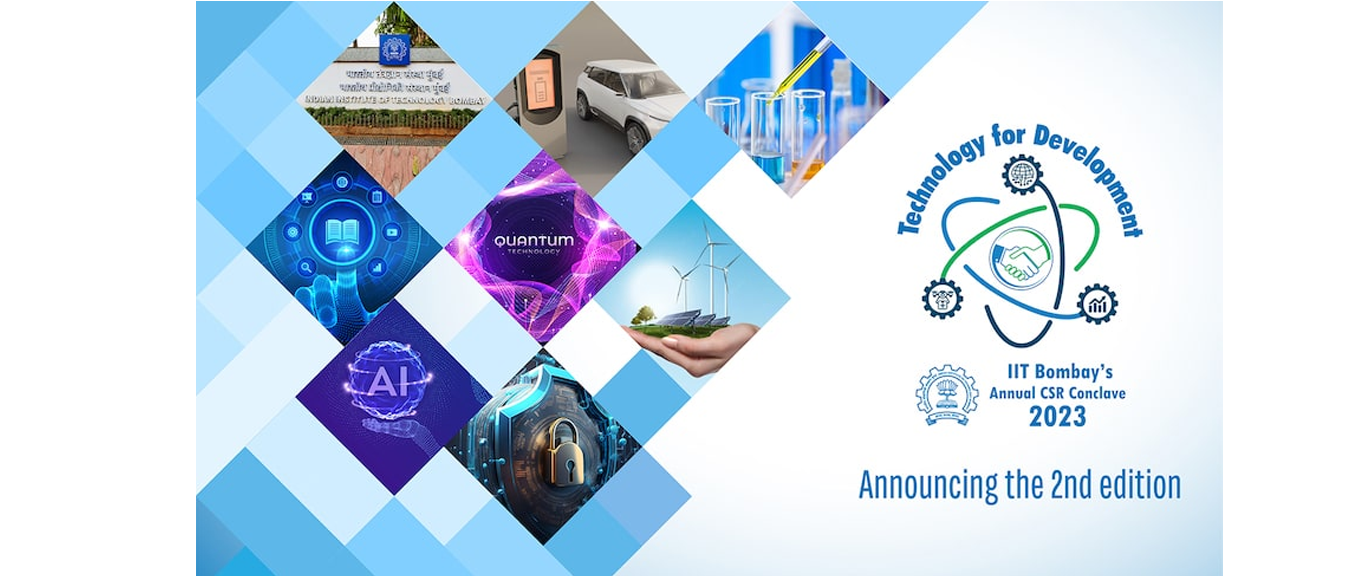IIT Bombay’s CSR Conclave Showcases Transformative Tech Solutions and Unites Inspiring and Trailblazing Visionaries, Corporate Leaders, and Disruptive Innovators
The second iteration of IIT Bombay’s annual flagship CSR Conclave – Technology for Development – was a resounding success. The event brought together a diverse range of stakeholders (including industry leaders and over 150 corporates, faculty, alumni, and students), ignited meaningful conversations, fostered innovative collaborations, and inspired those who attended to contribute actively to the greater good. The conclave provided a meaningful platform to explore the intersection of business and social impact and exemplified IIT Bombay’s enduring legacy of excellence in making a positive difference in society.

The Conclave reiterated IIT Bombay’s commitment to its academic programs and research initiatives which are focused on fuelling areas of strategic national importance. These include defence applications, quantum technologies, artificial intelligence and cybersecurity, driving economic development through the growth of critical industries such as semiconductors, green energy, electric vehicles, drugs, and pharmaceuticals and creating last-mile impact through technologies in SDG-aligned sectors such as healthcare, sanitation, clean water, and education technologies.
The Institute was clear in its vision to partner with corporates that are as committed as IIT Bombay towards nation-building by leveraging technology and achieving self-reliance and elevating its economic standards.
Chief Guest Ganesh Natarajan’s Rousing Speech and IITB DRF CEO, Mr. Ravi Gedela’s Address, Kickstarts the Conclave

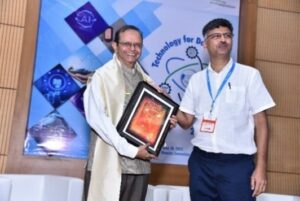
The Chief Guest, Dr. Ganesh Natarajan, Chairman, 5F World, and Chairman of the Board, Honeywell Automation India Limited, kickstarted the Conclave with a rousing speech that effortlessly bridged the gap between his professional trajectory and the aspirations of the attendees. “I believe that emerging technologies including virtual reality and generative artificial intelligence have a significant role to play in the betterment of society. Carefully designed processes and social interventions, powered by digital technologies, will accelerate social transformation. It is imperative that the best corporations partner with outstanding technology institutions to develop this architecture.” Mr. Natarajan’s heartfelt words resonated deeply, inspiring and empowering the audience to embrace their potential and leverage the power of technology to create meaningful societal change.

Mr. Natarajan’s speech was followed by Mr. Ravishankar Gedela, CEO, IITB DRF, who articulated a clear vision of IIT Bombay’s ambitious plans, detailing how the anticipated CSR funds would be strategically utilized to propel the Institute’s impactful initiatives forward. Mr. Gedela’s talk included several eye-opening statistics on CSR activity around the world and highlighted the interesting dichotomy with India’s strategic research pursuits. Key among them includes the fact that India has the highest productivity compared to advanced countries like the US, UK, Germany, Japan, and more. He also said that IIT Bombay has established itself as a globally competitive Institute despite having the lowest budgets compared to top-ranked universities like MIT, Caltech, Stanford, Harvard, and more. Mr. Gedela also showcased a visionary roadmap for driving impactful initiatives and empowering the institute to further its mission of excellence and social transformation.

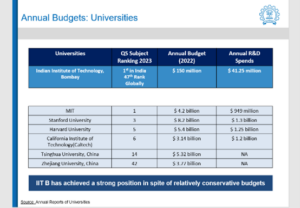
CSR Panel Discussions
Mr. Gedela’s talk was followed by the first of the three panel discussions of the day.

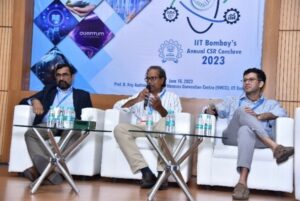
The first panel discussion on Strategic National Imperatives included:
- Anil Shama, Head, Corporate Incubation, Tata Consultancy Services
- Shridhar Shukla, Co-Founder, Chairman, KPOINT Technologies
- Udayan Ganguly, Department of Electrical Engineering, IIT Bombay
The session was moderated by Prof. Swaroop Ganguly, Department of Electrical Engineering, IIT Bombay.
While Dr. Shukla joked about returning to IIT Bombay as a Distinguished Alumnus only to be seated between two scary EE professors, the session included a lively and interesting conversation about the role that corporates can play in nation-building.
Mr. Sharma succinctly summarized the session by saying, “As we strive towards technological self-reliance, it is crucial for the industry to partner with exceptional technology institutions like IIT Bombay. By combining our expertise and resources, we can leverage emerging technologies such as semiconductors and quantum computing amongst others to drive social transformation and uplift our society.”
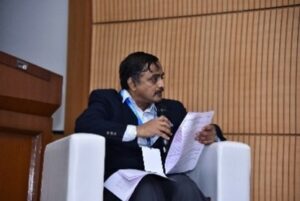

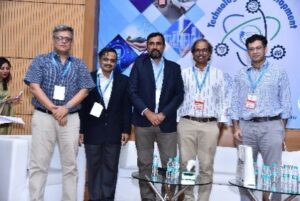
The second panel discussion on Industrial and Economic Development featured eminent persons including:
- Gajanan V. Gandhe, Country Head & Vice-President, Dana India
- Pankaj Doshi, Head of Predictive Science, Pfizer
- Rajeev M. Pandia, Independent Director, various chemical companies and Past President, Indian Chemical Council
- Vinay Malhotra, Managing Director, Schlumberger India
The session was moderated by Prof. Ravi Gudi, Dean, Alumni and Corporate Relations.
In a thought-provoking moment during the session, Mr. Gajanan Gandhe got to the core of the subject being discussed and said, “While the past CSR efforts have been focused largely on areas like poverty alleviation, hygiene, vocational support, etc., the industry now needs to think and act on how we can empower the population by supporting technological development that can provide employment to the millions of graduating professionals.”

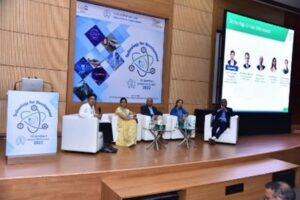

The third and final panel session of the day featured a very vibrant discussion on Last Mile Impact. Panellists included:
- Ashwini Saxena, Chief Executive Officer, JSW Foundation
- Pratyush Kumar Panda, Head ESG, LTIMindtree
- Rekha Koita, Co-Founder, Koita Foundation
- Rema Mohan, CEO, National Stock Exchange Foundation
The session was moderated by Prof. Pramod P. Wangikar, Department of Chemical Engineering, IIT Bombay.
The session started with a wonderful discussion among the panellists on the very definition of Last Mile Impact and the people who fall into that category and are most affected by it.
The discussion then delved deep into the role that technology plays in addressing the needs of everyone across the social and economic strata of society.
Mr. Ashwini Saxena encapsulated the session with, “Technology has always been an enabler and an equaliser when it comes to connecting the people at the far end with opportunities to address their needs. Technology also has the power to unlock latent needs to explicit ones and open new vistas of their potential. However, technology needs to be coupled well with managerial inputs and community connects so that technology too can be enabled. Without entrepreneurial support, technology may have its limitations in terms of creating a ‘public good.’”
CSR CHAMPIONS
During a special segment held in the afternoon, IIT Bombay hosted an exclusive award ceremony and recognised and honoured corporates who have made significant CSR contributions to IIT Bombay and collaborated with the Institute on high-impact initiatives, and continue to drive social change.
The Institute conferred the prestigious ‘CSR Champion’ award to the following corporates:

IIT Bombay acknowledged its collaborations with the above companies and thanked them profusely for their ongoing partnerships.
SHOWSTOPPER
Tech Showcase – Exhibition

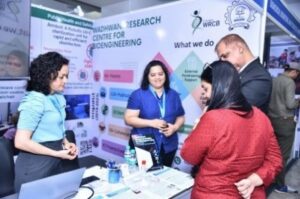
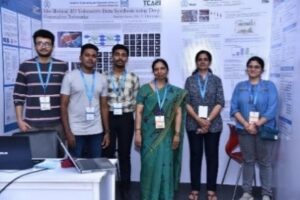
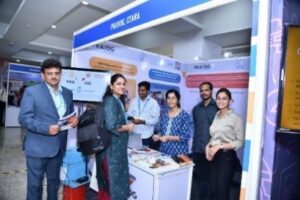
The showstopper of the conclave was the “Tech Showcase” which comprised two segments – Project Presentations and an Exhibition. Professors and students had the opportunity to exhibit their projects, which demonstrated the use of technology for addressing critical issues such as healthcare, education, agriculture, and environmental sustainability. The exhibition provided corporate and CSR leaders with an opportunity to interact with the students and professors involved in the technology initiatives.
Among the entities from IIT Bombay that showcased their latest research included:
- Biomedical Engineering and Technology Innovation Centre (BETIC): BETIC is working on developing indigenous medical devices by providing the necessary guidance and support to med-tech innovators
- Wadhwani Research Centre for Bioengineering (WRCB): WRCB supports faculty across various departments of IIT Bombay in undertaking breakthrough interdisciplinary translational research and technology commercialisation
- Sunita Sanghi Centre of Ageing and Neurodegenerative Diseases (SCAN): SCAN will focus on understanding disease mechanisms and developing innovative diagnostic and assistive technologies against neurological disorders
- Society for Innovation and Entrepreneurship (SINE): SINE supports tech-based entrepreneurial pursuits and facilitates academic research into viable products and companies in the industry
- Technocraft Centre for Applied Artificial Intelligence (TCA2I): TCA2I fosters collaboration between industry and academia in Applied Artificial Intelligence through various outreach programs and teaching activities
- Tata Centre for Technology and Design (TCTD): TCTD designs technology solutions to help resource-constrained communities in India and globally
- IIT Bombay Nanofabrication Facility (IITBNF): IITBNF facilitates research excellence, learning, and outreach in the fields of semiconductor technology and nanotechnology
- Prayog CTARA: CTARA collaborates with government agencies, nonprofits, corporates & academic institutions to solve various development issues
- E-Mobility: E-Mobility creates an integrated workspace for multidisciplinary research and state-of-the-art R&D facilities, with the ultimate goal of bringing IIT Bombay to the forefront of EV Research & Development
- e-Yantra: e-Yantra is focused on training students, teachers, and institutions by fostering a culture of innovation to solve real-world challenges using technology
Tech Showcase – Project Presentations
In what was one of the most impactful and dynamic events of the day – four individuals from IIT Bombay made presentations outlining the research pursuits of their organizations as part of the “Tech Showcase.” All four presenters electrified the audience with their presentations even as they joked about the attendees’ staying power that late into the evening after a jam-packed day.
“The presentation and examples of technology shown by the presenters were outstanding!”
“We had no idea the sheer depth of IIT Bombay’s technological innovation and prowess!”
These were just a few of the revealing comments made during casual anecdotal conversations with attendees after the project presentation. Attendees unanimously revealed their awe at the thought-provoking and dynamic presentations of e-Yantra, the Wadhwani Research Centre for Bioengineering (WRCB), the Biomedical Engineering and Technology Innovation Centre (BETIC), and the Makerspace initiative.
e-Yantra:
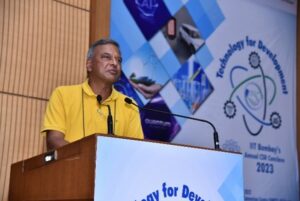
Prof. Kavi Arya from the Department of Computer Science and Engineering (CSE) presented on the topic of Student Innovators for Local Disruption: Turning Problems Into Opportunities. e-Yantra is a robotics outreach program funded by the Ministry of Education and hosted at IIT Bombay.
In a thrilling presentation that included snippets from the many innovative activities being pursued by students and teachers as part of e-Yantra, Prof. Kavi Arya demonstrated its instrumental role in promoting “learning by doing.” These included building a drone-control system from scratch, UR5 arm-based robot that navigates a greenhouse and plucks ripe tomatoes, and an Autonomous Ground Vehicle (AGV) that traverses a simulated greenhouse and finds, picks, and places tomatoes.


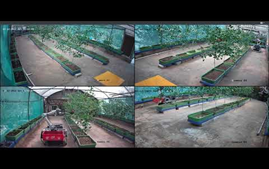
Some of the startups that came out of e-Yantra include Drona (sewer cleaning), Katomaran (AI/ML and Robotics), Heaven Designs Pvt. Ltd. (solar energy), Carloman Systems, Rymo, and more.
Over the years, e-Yantra has benefitted over 207,300 students, and 3,250 colleges, offered over 500 internships, trained over 6000 teachers, and established over 400 ‘e-Yantra Labs.’
WRCB

Dr. Abdur Rub, CEO of the Wadhwani Research Centre for Bioengineering (WRCB) presented the Centre’s dynamic pursuits in supporting technology translation and commercialisation in the Centre’s four focus areas:
- Diagnostics: Biosensors & sample prep, HIV, Inf. Dis., Cardiac Health, diabetes, neurological, sepsis, cancer
- Therapeutic: Tuberculosis, Respiratory disease, Alzheimer, Diabetes, Leukemia, Breast, and other cancers
- MedTech: Wearable devices, BP monitoring, EEG, Gait monitoring, Disease modeling, Wound healing, Dialyzers, Brain Machine Interface
- Sustainability: CO2 capture, Synthetic Biology, Protein engineering bioproduction of therapeutics, Chiral alcohols, and flavans
WRCB currently has several projects underway at the Centre. These range from projects on women and child health, public health and safety, technologies for PHCs, platforms for drug screening and development, and indigenous R&D.
Dr. Rub also highlighted the many startup successes of WRCB including ImmunoAct, Algorithmic Biologics, Convalesce, Clarity Bio, MetFlux, EffecMed Pvt. Ltd., and more.
Overall, the Centre has successfully commercialized 19 technologies and is currently supporting 30 technologies in the translation and commercialisation pipeline.
BETIC
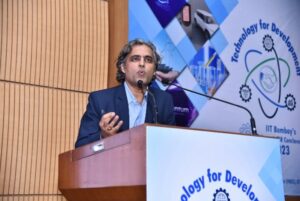
“Bringing doctors, engineers, entrepreneurs, and investors together
for indigenous development of affordable medical devices.”
Dr. Rupesh Ghyar, BETIC
In another dynamic display of the depth of disruptive technologies being pursued by IIT Bombay, Dr. Rupesh Ghyar, SEO, Biomedical Engineering and Technology Innovation Centre (BETIC), elaborated on the four key concepts followed by the Centre. These are: Idea → Invention → Innovation → Impact
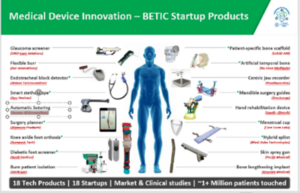
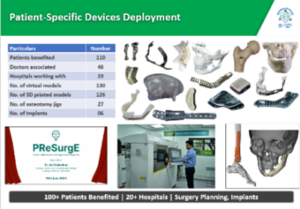

Dr. Ghyar detailed the various stages of BETIC’s medical device innovation facilities and processes on campus. He also spoke at length about BETIC’s startup products including OKO Icare Solutions (Glaucoma Screener), Aur Innovations (Flexible Burr), Atmen Technovention (Endotracheal Block Detector), Ayu Devices (Smart Stethoscope), (Denovo Bioinnovations (Automatic Suturing), and many more.
BETIC also collaborates with the industry on several products including a Scalp Cooling Cap with Curotherm, a Drug Nebulizer with QMS Medical, Automated CPR with Elan Vital Technology, Electrochemo Therapy with Tenon Meditech, Clubfoot Monitor with Metwiz Medicals, and many more.
Since it was set up, BETIC has won numerous awards, organized several medical camps and medical device hackathons, deployed myriad medical devices including KAFO (Polio Callipers), AyuSynk (Smart Stethoscope Module), Vibrasense, Neumu (diabetic foot screener), and has been featured prominently in the media for its outstanding achievements.
Makerspace Initiative
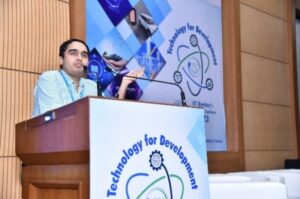
Prof. Varun Bhalerao, Department of Physics, spoke eloquently on IIT Bombay’s Makerspace initiative. In his presentation, Prof. Bhalerao outlined how real-world problems are multi-disciplinary in nature and that the Institute needs to prepare students with globally relevant training. He called the Makerspace initiative the missing link between academic activities and entrepreneurship and how it complements resources on campus like the Desai Sethi School of Entrepreneurship (DSSE).

Proposed New DSSE Building on Campus
The Makerspace initiative includes the ‘Kadayam S. Srinivasan’ and ‘Harivallabh Nagar’ Micro-Factories, the Tinkerers Lab, the Deepak and Maya Saltwalekar Design and Making Lab, the Batch of 1980 Design and Making Lab, and more. Prof. Bhalerao made a passionate case for how IIT Bombay’s facilities are now on par with some of the best in the world including MIT, Stanford, UC Berkley, and more.
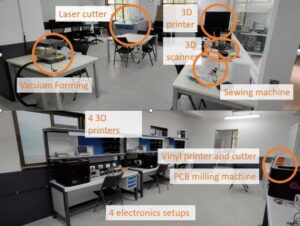
State-of-the-art Equipment available to students as part of the Makerspace initiative
Prof. Bhalerao wrapped up his presentation with a look at the future. The Makerspace initiative will include Institute-wide “hands-on” activities integrated under one roof. These will include several thematic like Bio-labs, Robotics and Drones, Product Integration and Assembly, Materials and Chemistry, Advanced Design Studio, and more.
Vote of Thanks
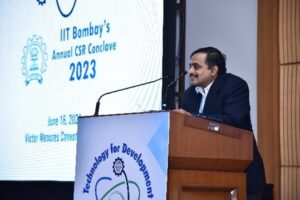
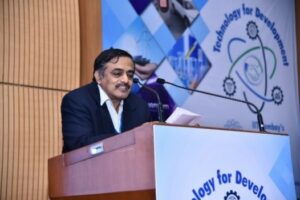
The event came to an end with Prof. Ravi Gudi proposing the vote of thanks. He extended his sincere gratitude to all of the participants who made the CSR Conclave a resounding success. He thanked Mr. Natarajan’s insightful words that left an indelible mark on the attendees even as the esteemed panellists and their expertise and thought-provoking discussions ignited new ideas and perspectives. Prof. Gudi also took a moment to thank all of the corporates, professors, students, and other attendees who contributed their valuable insights and unwavering support throughout the conclave.
IIT Bombay’s CSR Conclave – Tech for Development – forged lasting connections and set in motion a collective commitment towards utilising technology to create a brighter and more sustainable future. The Institute eagerly looks forward to continuing this impactful journey together.
Onwards and upwards!

